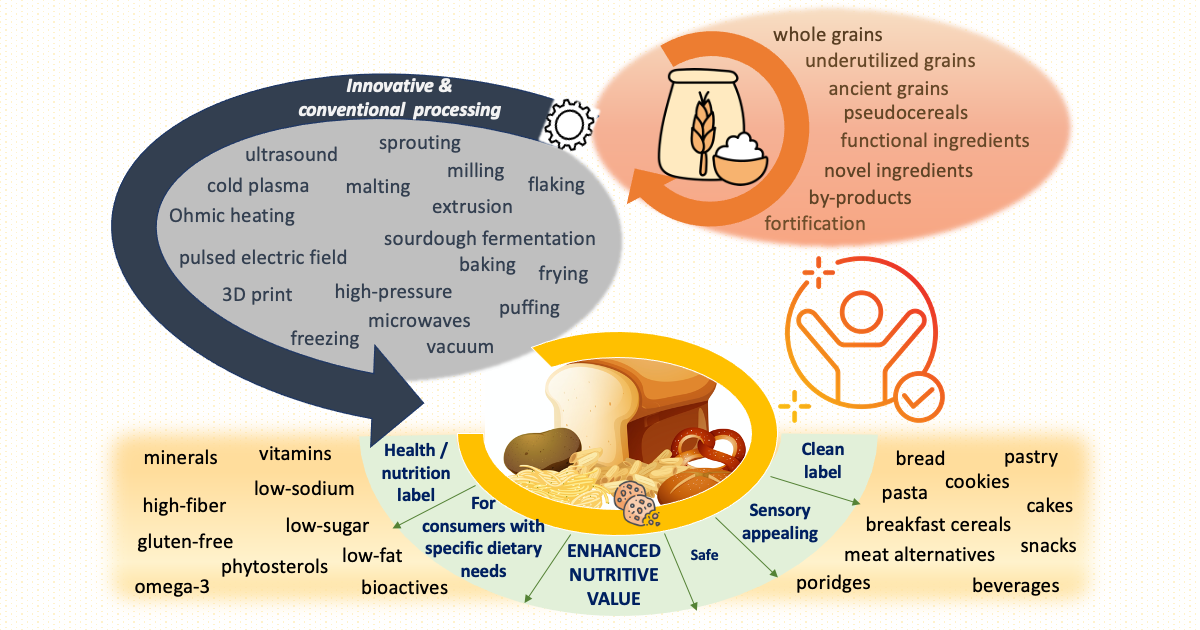- 5.1Impact Factor
- 8.7CiteScore
- 15 daysTime to First Decision
Approaches for Improving Nutritional Aspects of Cereals and Cereal-Based Foods
This special issue belongs to the section “Grain“.
Special Issue Information
Dear Colleagues,
Cereals are a cornerstone of global food security because they are a staple food and an important source of essential nutrients. However, optimizing the nutritional potential of cereal-based products requires a multifaceted approach that balances the needs of consumers for a healthy diet with the requirements of an attractive and safe product. The exploration of whole grains and underutilized grains, as well as the use of traditional and innovative technologies in the implementation of clean label processes, represent a comprehensive strategy to add value to cereal-based products. This Special Issue presents contemporary and traditional strategies to augment the nutritional profile of cereals and cereal-based products. The topics addressed include but are not limited to synergistic approaches that take into consideration ancient and underutilized grains, sustainable minimal or fortification processing techniques, the use of novel ingredients, and product development for specific dietary needs with consumer preferences in mind. This call to action invites the submission of research articles and reviews.
Dr. Dubravka Novotni
Dr. Bojana Voučko
Dr. Nikolina Mustač
Guest Editors
Manuscript Submission Information
Manuscripts should be submitted online at www.mdpi.com by registering and logging in to this website. Once you are registered, click here to go to the submission form. Manuscripts can be submitted until the deadline. All submissions that pass pre-check are peer-reviewed. Accepted papers will be published continuously in the journal (as soon as accepted) and will be listed together on the special issue website. Research articles, review articles as well as short communications are invited. For planned papers, a title and short abstract (about 250 words) can be sent to the Editorial Office for assessment.
Submitted manuscripts should not have been published previously, nor be under consideration for publication elsewhere (except conference proceedings papers). All manuscripts are thoroughly refereed through a single-blind peer-review process. A guide for authors and other relevant information for submission of manuscripts is available on the Instructions for Authors page. Foods is an international peer-reviewed open access semimonthly journal published by MDPI.
Please visit the Instructions for Authors page before submitting a manuscript. The Article Processing Charge (APC) for publication in this open access journal is 2900 CHF (Swiss Francs). Submitted papers should be well formatted and use good English. Authors may use MDPI's English editing service prior to publication or during author revisions.
Keywords
- cereal-based foods
- functional foods
- consumer preferences
- whole grains
- clean label
- ancient grains
- sustainable processing
- product development
- specific dietary needs

Benefits of Publishing in a Special Issue
- Ease of navigation: Grouping papers by topic helps scholars navigate broad scope journals more efficiently.
- Greater discoverability: Special Issues support the reach and impact of scientific research. Articles in Special Issues are more discoverable and cited more frequently.
- Expansion of research network: Special Issues facilitate connections among authors, fostering scientific collaborations.
- External promotion: Articles in Special Issues are often promoted through the journal's social media, increasing their visibility.
- e-Book format: Special Issues with more than 10 articles can be published as dedicated e-books, ensuring wide and rapid dissemination.

